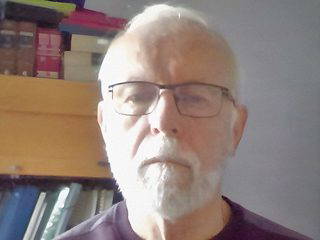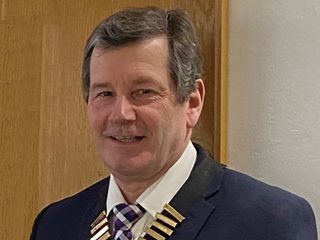
Institute News
The Institute was very pleased to learn recently of the Distinguished Service Award given to David Harvey, a former member of ICorr Council, for his valuable contributions to the development of British, European and International standards which is very well deserved. www.bsigroup.com/en-GB/products-and-services/standards/
David Harvey, now retired, has over 40 years of experience in the cathodic protection field, working in the industry for engineering consultants, engineering design and project management companies, EPC contractors, and national operating companies in both the UK and Middle East, covering the design of cathodic protection systems for both onshore and offshore structures.
We offer our many congratulations to David on receipt of this award from the British Standards Institution (BSI) after 37 years as a member of the BSI GEL/603 Cathodic Protection Committee, 18 years as a member, and 19 years as its Chair.
David has made many valuable contributions to the development of our Institute, and you may like to read his article on ICorr website: www.icorr.org/fellows-corner-a-career-as-a-cathodic-protection-engineer/
David Harvey CEng, FICorr (Hon).
Above: BSI Distinguished Service Certificate Given to David Harvey.
Institute News
Hello from the CORREX team!
We are currently working on some very exciting things in the background, and I can now announce the first of them.
CORREX has become an ATO, Approved Training Organisation for CITB, the Construction Industry Training Board.
We now have the ICATS, ICA, Blaster, Spray, and Supervisor modules all accepted. All these courses are eligible for Levy payment status. Companies with a unique CITB number can send those details to me, and I will upload them onto the system. Then, whenever ICATS training takes place, send those details to me with the student details, and I will upload them to our CITB portal. This will stimulate payments to you directly from CITB.
Watch out for further exciting information.
For any further inquiries, please contact me at CORREX or directly at my usual email address.
Kind regards Kevin Harold, CORREX Ltd Managing Director
kevin@paintel.co.uk

Institute News
Dear Members,
Welcome to the March-April issue of the Corrosion Management.
Since our January–February issue, two significant events have come to pass:
WCO – World Corrosion Awareness Day launched by the WCO in 2010 and International Women’s Day declared by
the United Nations in 1975.
International Women’s Day was observed with great enthusiasm all throughout the world on 8th March. Multimedia publications featured images and narratives showcasing the achievements of women. Many forums condemned the manner in which women are still oppressed and advocated for improvements to women’s rights. With continuing tales of women’s subjugation, my heart was heavy with misery. However, when l began compiling our latest magazine and saw the first piece by three female scholars from the Department of Materials, Henry Royce Institute at the University of Manchester (UoM), it gave me hope for a brighter future. Seeing women succeed in STEM fields fills me with immense pride. Worldwide, a large number of corrosion societies celebrated Corrosion Awareness Day on 24th April. Numerous events, including podcasts, quiz contests, and webinars, were organised. On their websites, many corrosion societies also posted educational or technical content. This issue of the magazine features a special article on the World Corrosion Awareness Day for which this year our North-West branch are planning their own special celebrations.
This edition is themed on recent Advances in Coatings. Eve Brittain, Safiya Al Abri and Beatriz Mingo (UoM) have written first article “Corrosion and Tribological Behaviour of Plasma Electrolytic Oxidation Coatings”. This work aims to evaluate the influence of the processing frequency on the coatings’ microstructure, corrosion and wear response. The second article “Corrosion Protection and The Environment-Inorganic Zinc Silicate Coatings-Hot Dip Galvanizing” is contributed by Nick Karakasch. This article is compressed version of his detailed work on zinc silicate coatings. In line with our latest Industry News, Keith Birkitt and James Hobbs of UK HSE have written the final article, “Atmospheric Corrosion and Failure of Oil Pipeline in a Complex environment”.
We welcome all contributions, so do please send me all your content for consideration including industry news, technical articles, and articles for fellow’s corner.
Dr Shagufta Khan, FICorr
Consulting Editor, editor@icorr.org

Institute News
Dear Members,
I do hope that you are all progressing well in your careers, and for those members who are now retired, that you all remain in good health. It has already been a very busy year for the Institutes Operating Divisions and Regional Branches.
YICorr has been especially active with the launch on 25th January of its 2024 Young Engineer Programme (YEP) at Wood Thilsted in London under the watchful eyes of Danny Burkle / Izabela Gajewska / Anthony Setiadi / Praveena Nanthakumaran / Stephen Shapcott (all former YEP graduates and stakeholders), which l was very pleased to attend alongside Jane Lomas, our Hon. Secretary and also Yunnan Gao our Vice President. It was very encouraging to see our twenty-five New Student Members so focussed and ready to learn. Jane presented very engagingly to the assembled audience on the Fundamentals of Corrosion. Our YEP bi-annual event, is a very much in demand, a year-long series of in-person meetings designed to provide valuable insights and networking opportunities for young engineers in the field of corrosion, including a major case study and the opportunity to visit the AMPP25 conference and its leadership programme for the winning group generously funded by BP. support of this AMPP/ICorr co-operation l have been in recent discussions with the AMPP board regarding further event and training opportunities.
Behind the scenes and alongside our Vice President Yunnan Gao
l have been actively exploring New UK Branches and areas for
co-operation with other Global corrosion societies and Universities overseas, in order to expand ICorr’s global offering and seeking increased engagement with our overseas members. The first of these Joint Events will take place on Tuesday 28th May 2024 when Susan Jacob of OneGas, Tulsa, Oklahoma will speak to us on a new risk assessment model for buried pipeline coating systems. AMPP is also keen to co-operate with ICorr in respect of pursuing a common standard / level of competence for Passive Fire Protection (PFP) Training. During the last quarter, we have also reached out to the Chinese Society for Corrosion and Protection (CSCP) and representatives of Qatar University, again for both event and training co-operation, with joint activities likely to start in Q4, 2024. I outlined some of these developments in my recent ‘State of the Nation’ presentation to our London Branch in March. We especially welcome, at this time, the new Wales and South-West Branch and Committee under the splendid chair of Sarah Bagnall. Their inaugural event on 21st March was a tremendous success, and it is clear that they have very solid support from within their region and we congratulate them for forming such a strong committee in such a short space of time. Please visit their webpage at: Wales and South West Branch – Institute of Corrosion (icorr.org) They have several more interesting Events upcoming so do keep an eye on the ICorr Events Calendar at: https://www.icorr.org/events/
Our training divisions continue to go from strength to strength and we must pay tribute at this time to our Cathodic Protection and Surface Treatment Scheme Managers Bill Whittaker and John Fletcher for their continued progression and also to our HQ team that support them.
Finally, I must express our sincere thanks to the Correx board for their generous financial support of the Institute during the past financial year from their own training operations. That only remains for me to pass on my best wishes and thanks to you all for the approaching summer ICorr activities and for making those all possible.
Stephen Tate, President: Institute of Corrosion,
president@icorr.org
Institute News
Example of the ICorr Surface Treatment courses delivered round the world.
Institute News, Uncategorized
The Institute of Corrosion is currently in the process of becoming a Full
Licensee of Engineering Council, in order to be able to provide CEng,
IEng and EngTech, directly through ICorr in future. This will be a major
improvement to our membership offering and member retention.
We are now looking for Professional Registration assessors (for both
Applications and Interview assessment purposes).
- Are you Engineering Council registered at CEng level?
- Do you want to give back to the profession by helping the next
generation of engineers achieve professional registration?
- We are looking for volunteers to become Professional Registration
Interview (PRI) assessors who will be reviewing, assessing, and
interviewing applicants.
By giving us your time, you will be doing vital work ensuring the future of
the profession. All we need from you is 6 hours of your time per month.
If this is of interest to you, please reply: F.A.O Anthony Setiadi admin@icorr.org and we will be in touch with you about the next steps.




